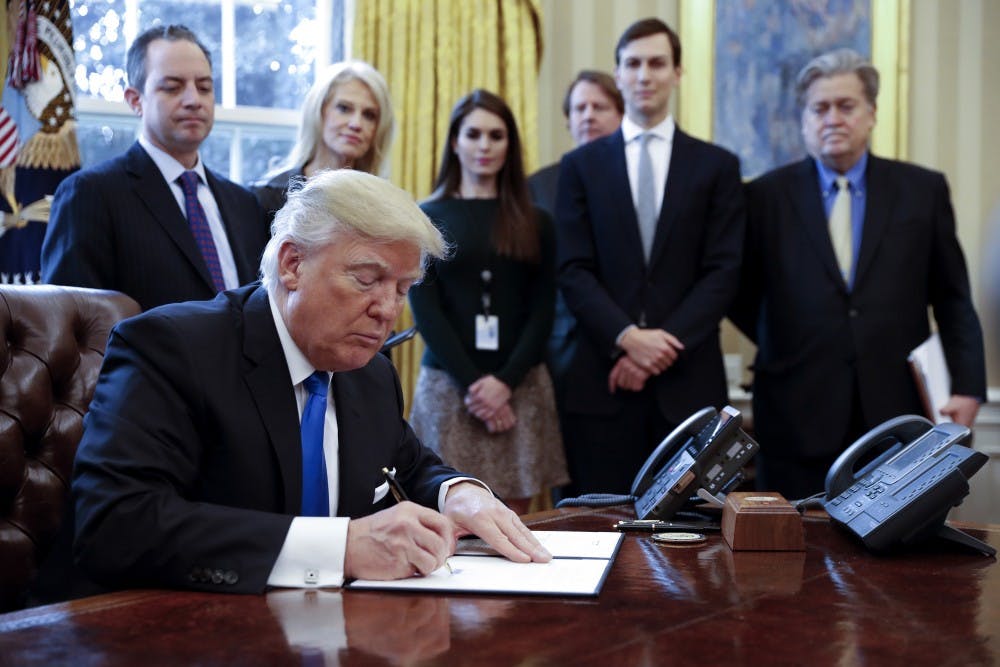Since President Trump was sworn in Friday, his first week has been packed with executive orders, appointments and White House press briefings. Here is a rundown.
Alternative facts
White House Press Secretary Sean Spicer said at the first White House press briefing Jan. 21 the Trump inauguration ceremony had drawn the “largest audience ever to witness an inauguration, period.” Media outlets shortly came out to say Spicer was incorrect. The Washington, D.C., metro reported 193,000 riders by 11 a.m. on the day of Trump’s inauguration in comparison to 513,000 riders for Barack Obama’s 2009 inauguration. Spicer also said White House ground coverings made the audience appear smaller in photographs and video. However, the same White House ground coverings were used when Obama was sworn in for his second term in 2013. Spicer took no questions from the media at the press briefing. The crowd controversy has been named “CrowdGate.”
Trump campaign strategiest and counselor KellyAnne Conway defended Spicer’s statements on NBC News. She told NBC’s Chuck Todd that Spicer was not lying; rather, he was giving “alternative facts,” and she said Trump’s inauguration turnout could not be quantified.
Keystone and Dakota Pipelines pushed forward
Trump signed executive actions to advance the Keystone XL and Dakota Access pipelines Tuesday. Immediately following this Sen. Bernie Sanders, D-Vermont, released a statement in opposition to Trump’s order. “President Trump ignored the voices of millions and put the short-term profits of the fossil fuel industry ahead of the future of our planet,” Sanders said.
Withdrawal from Trans Pacific Partnership
On Monday, Trump signed an executive order to remove the United States from the Trans Pacific Partnership. The TPP is a trade deal that would have aligned the U.S. with 11 nations, including Japan, Vietnam, Australia, Canada and Mexico, in the Asia-Pacific. The agreement would have eliminated thousands of tariffs and restructured regulations to ensure efficiency. The countries involved in the deal conduct about 40 percent of global trade. Trump said withdrawing the U.S. from the TPP is a “great thing for the American worker.”
Freeze on federal hiring
Trump signed an executive order to freeze federal hiring, excluding the military, Monday. This freeze also includes a halt on pay raises for all government employees.
Reinstatement of Mexico City Policy on abortion access
Along with the freeze on federal hiring and withdrawal from the TPP, Trump signed an executive order to reestablish the Mexico City Policy involving nongovernmental organizations and abortion access. The act, originally signed into law by Ronald Reagan in 1984, required NGOs as a condition for federal funding that they “would neither perform nor actively promote abortion as a method of family planning in other nations.” Bill Clinton rescinded the act when he became president in 1993. George W. Bush reinstated it upon taking office. Barack Obama rescinded it again in 2009. Now Trump has brought the policy back once again.
FHA mortgage premium cut cancellation
As one of his first acts as president, Trump signed an executive order Friday to eliminate a discount on the fees for a federal mortgage program that helps homebuyers with small down payments or less-than-perfect credit scores. About one in five mortgages is backed by the Federal Housing Administration, according to CBS News. Former Housing and Urban Development secretary for the Obama administration, Julian Castro, said the cut, of a quarter of a percentage point, was necessary to offset rising mortgage rates. If it had gone in effect, it would have saved a homebuyer borrowing $200,000 about $500 on their yearly insurance premium.
Obama’s health care law provisions waived
Along the FHA mortgage cut cancellation, Trump signed an executive order Friday to waive “Obamacare” provisions. The executive order will allow agency heads to waive or defer provisions that “impose a fiscal burden on any State or a cost, fee, tax, penalty or regulatory burden on individuals, families, healthcare providers, health insurers, patients, recipients of healthcare services, purchasers of health insurance or makers of medical devices, products or medications.”




